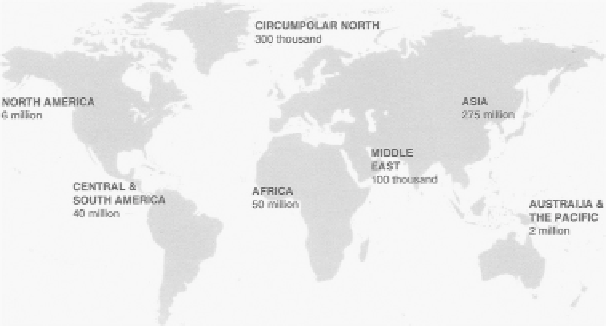Geography Reference
In-Depth Information
Norway and the United States, they comprise small minorities. Most Indigenous
Peoples, including the Xavante in Brazil and the Mapuche in Chile, strive to preserve
traditional ways of life, while others seek greater participation in mainstream society.
Despite their vast geographic and cultural differences, Indigenous Peoples share a
common experience: they are among the most disadvantaged and vulnerable groups
of people in the world today.
Figure 11. World Map of Indigenous Population.
Indigenous Peoples also hold many positive qualities in common. Most Indigenous
cultures share worldviews based on a spiritual and material relationship to the Earth
that honors all things that give life as sacred, including the land itself. Another
striking common characteristic is a collective economy of gift-exchange, practiced
by Indigenous nations worldwide to ensure an equitable distribution of resources
rather than mere accumulation by individuals.
During the era of European colonial expansion and imperialism, most Europeans
considered themselves superior to native peoples from regions such as Africa, Asia,
and the Americas, whom they regarded as “primitives” or “savages” to be dominated.
This attitude justified the invasion and settlement of these “virgin territories” and
even slavery of the native “inferior people.” European missionaries have sought
to “save” and “civilize” native peoples by leading them out of “paganism” to
Christianity, thus imposing on them the strict control of both Church and State.
Throughout this process of colonial domination, Indigenous Peoples were
systematically deprived of their land and its resources, their languages and histories,
their cultural identities and ways of life. Thousands of groups were wiped out
altogether by diseases introduced by colonizing peoples, sometimes through explicit
policies of extermination - including, for example, the sanctioned distribution of
infected blankets and expired medications. Most Indigenous societies that have
survived into the 21
st
century are predominantly subsistence-based, that is, they

